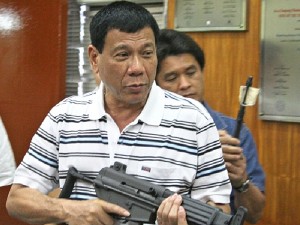DAVAO CITY — The New York-based Human Rights Watch (HRW) has called on the government to investigate Mayor Rodrigo Duterte’s possible role in the summary executions that took place here since he became chief executive – almost continuously – since 1988.
HRW said that during Duterte’s terms as chief executive, over 1,000 suspected law offenders – many of them involved in the illegal drug trade – had been killed and the mayor “continued to espouse the killing of criminal suspects to combat crime.”
In a media statement, HRW cited Duterte’s latest speech on how the city became the 9th safest in the world. During that speech, Duterte said his secret was to “Kill them all (criminals).”
READ: Duterte on criminals: ‘Kill all of them’
In his latest speech on effective crime control in the city, Duterte said he did not care if cases were filed against him in court, insofar as his policy on criminals was concerned.
“Why should I be afraid to go to prison?” he asked participants to the national convention of the Workplace Advocates on Safety in the Philippines (Waspi) held here last week.
“When you start to be soft in this country and allow Western thoughts to sip in, that’s when you start to have problem,” he said, referring to the death penalty and the concept of rehabilitation for criminals as ideas “imported” from the West. “They want to rehabilitate instead of just killing the idiots,” he said.
“The Philippine government should take a zero-tolerance approach to any public official who publicly endorses extrajudicial killings as an acceptable means of crime control,” Phelim Kine, HRW deputy Asia director, said.
Kine said Duterte’s public support for the extrajudicial killings of suspected criminals “should prompt a long overdue investigation” into his possible role in those deaths blamed on the so-called Davao Death Squad (DDS).
READ: Davao ‘Death Squad’ strikes again
HRW said it has documented the existence of the DDS and Duterte’s role in the killings as early as 2009 but Duterte had always been off the hook.
The Commission on Human Rights also conducted a similar probe, which resulted in the implication of police officers. Duterte had never been charged and 21 of the police officers were found guilty by the Ombudsman of simple neglect of duty and fined them the equivalent of a month’s salary.
HRW said the Court of Appeals later overturned the verdict.
“To date, not one person has been convicted for involvement in any of the killings,” the rights group said.
“Duterte has a long history of inflammatory public statements that would seem to encourage the extrajudicial killing of suspected criminals” but he has never been charged, the HRW said.
READ: Human rights group slams senators’ tolerance for Duterte’s threat to kill smugglers
“The long official tolerance of Duterte’s advocacy of summary killings as effective crime-fighting strategy needs to stop,” Kine said. “The government should send an unambiguous message to Duterte and other officials that support for extrajudicial killings results in an investigation – not in speaking tours.”


